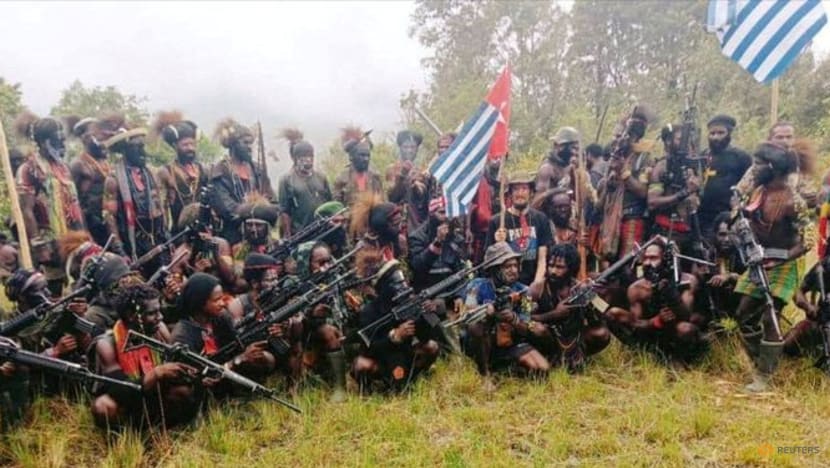How Indonesian village aid funds weapons for Papua's rebellion

A man who is identified as Philip Mehrtens, the New Zealand pilot who is said to be held hostage by a pro-independence group, sits among separatist fighters in Indonesia's Papua region in this undated handout picture released on May 26, 2023. (Photo: The West Papua National Liberation Army (TPNPB)/Handout via REUTERS)
JAKARTA: Separatists in the Indonesian region of Papua where a New Zealand pilot was taken hostage in February have been siphoning off government aid money to buy black market guns for a deadly guerrilla war, officials say.
The Dana Desa village fund introduced by President Joko Widodo in 2015 and valued at US$4.7 billion this year has long been criticised as prone to corruption. Nowhere is the oversight of the scheme more challenging than in Papua's remote highlands.
More than 3,000km from Jakarta, Papuan rebels have been fighting for independence since the region rich in copper, gold, nickel and natural gas was absorbed by Indonesia after a 1969 vote.
The escalating insurgency is coinciding with a spike in illegal weapons sales in the region, according to lawyers and court documents, with the village fund providing a key source of revenue.
In 2015, there was just one case of illegal weapons and ammunition trade in Papua, court documents and reports show. By 2021, the number jumped to 14.
Related:
In Nduga, where Susi Air pilot Phillip Mehrtens has been held hostage for more than three months, so concerned are police the village fund is being used to buy guns they have asked the central government to withhold the US$14 million allocated to the district this year.
"If we don't block this, then the village fund will flow to the village and they (rebels) might keep asking for support … Maybe to buy weapons, to buy food," Papua police spokesperson Ignatius Benny Ady Prabowo told Reuters.
Otomi Djiwangge, a spokesperson for the Nduga district government, said Dana Desa was "not supported by the right monitoring" and the local government had no authority to supervise it.
"So it's reasonable if the use of the village fund is somewhat loose and anyone can do what they want with it."
He did not comment on the claim the fund is utilised by rebels, as it was just a presumption, he said.
ILLEGAL ARMS
It is unclear how much of the US$337 million in village funds allocated for the Papua region in 2023 is being diverted into arms.
But Faizal Ramadhani, head of the Cartenz Peace Operations taskforce which oversees security in Papua, told Reuters about 40 per cent of illegal arms cases he investigated involved funds from the Dana Desa programme. He declined to provide further details.
Spokespeople for the national police and military declined to comment for this story.
The finance ministry, which oversees distribution of Dana Desa, said monitoring mechanisms were in place to ensure the funds were used as intended, but declined to comment on the claim that Papuan rebels have been misappropriating money.
In 2021, NGO Indonesia Corruption Watch identified 154 cases of alleged corruption related to the fund, the highest of any government sector spending.
Sebby Sambom, spokesperson for the West Papua National Liberation Army (TPNPB), the armed wing of the Free Papua Movement, denied rebels used village funds but did say the group was in part inadvertently funded by the state.
"We have a rich land so we do it in our way. We can make money through gold mining and timber and also many government payments," he told Reuters. "We have a right to use that money."
Designed to spur economic growth, Dana Desa has tripled in size since 2015, but in Papua, some say there is little to show for it.
"I have never seen a project funded by the village fund, not at all," said Bernadus Kobogau, a tourism official in Intan Jaya. Instead, he said, deadly skirmishes once confined to the jungle now occur in the middle of town.
"REVOLUTIONARY TAX"
The increased firepower of Papua's rebels was evident in recent photos released along with a threat to shoot Mehrtens if independence talks don't start within two months.
The rebels in Nduga brandished a grenade launcher, several machine guns and 18 assault rifles, including those produced by state weapons munitions maker Pindad, according to Deka Anwar, from the Institute for Policy Analysis of Conflict (IPAC).
"Gone are the days that Papuan rebels would save precious bullets," said Anwar. "Now they can shoot for days."
In Papua's highlands, village funds are treated like a "revolutionary tax", he said, commandeered either via intimidation and coercion, or given willingly by supporters of independence.
Deposited directly into village bank accounts, the funds are regularly handed out in cash by village heads in the Papuan highlands.
"They have a lot of money in Papua, so it is easy to buy the weapons," said Latifah Anum Siregar, director of the Democracy Alliance for Papua (AIDP) and a lawyer who covers illegal weapons sales cases.
Compounding the problem, rebels are mostly buying weapons from corrupt military and police officers, she said.
One officer travelled to the Papuan town of Nabire nine times to illegally sell weapons, according to court documents.
"In Indonesia we call it 'senjata makan tuan,'" said Siregar of a dynamic replete with irony: rebels weaponising state funds to fight against the state. "It means it backfires."










